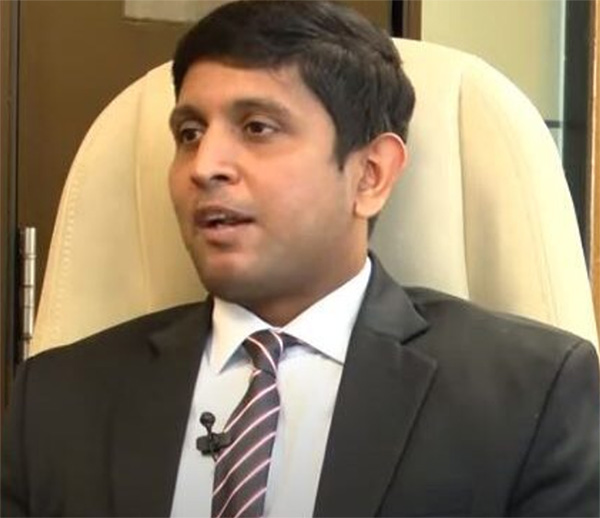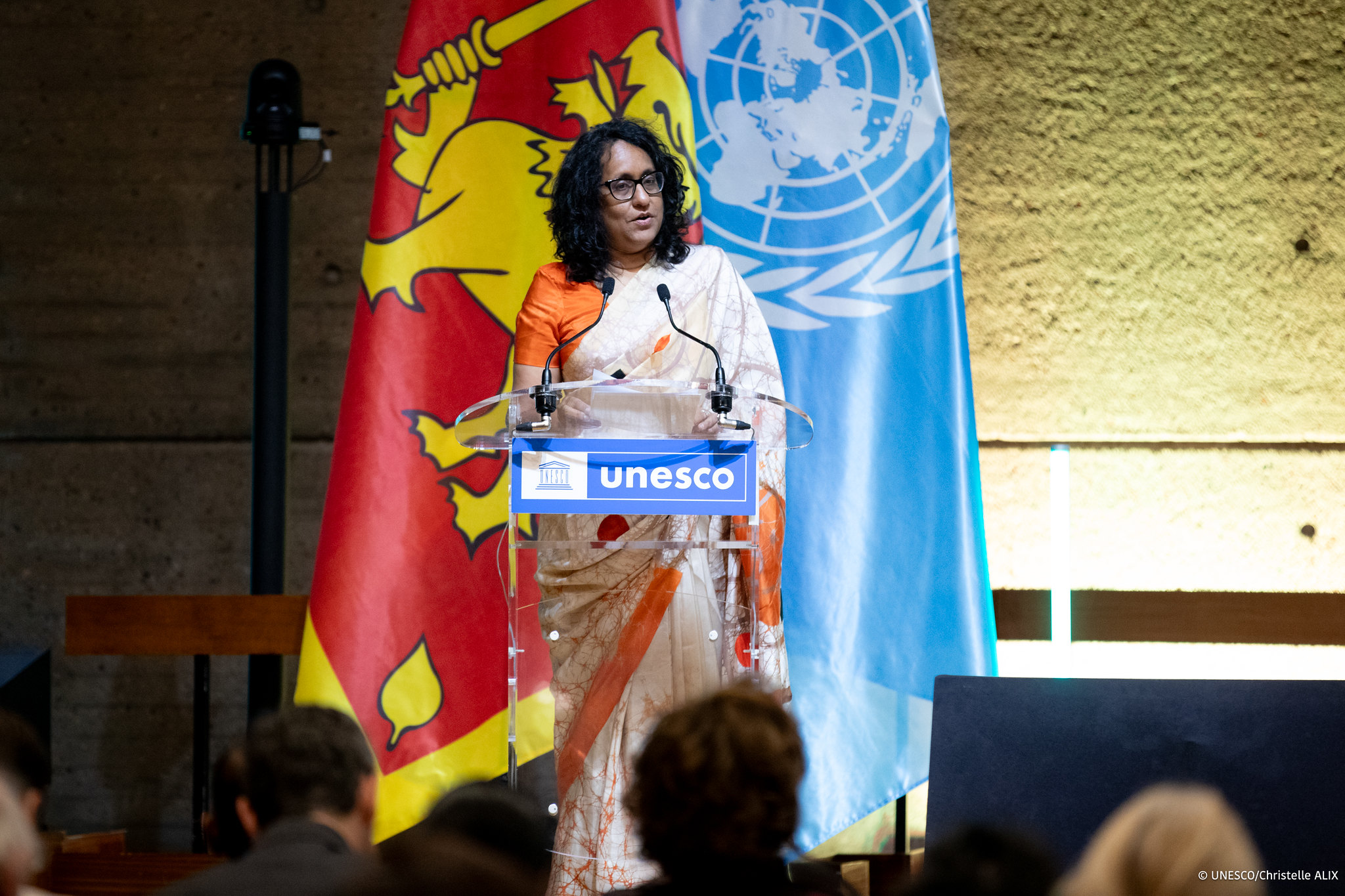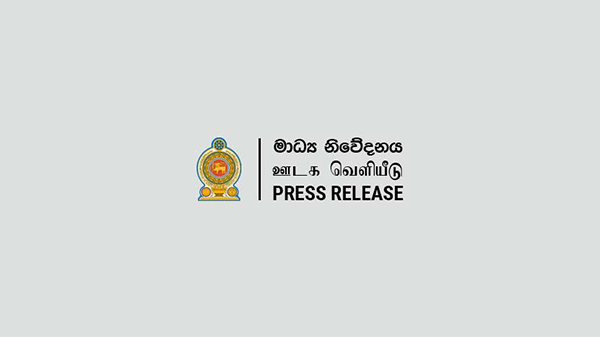News
Lankans arrested in Gujarat over terrorism charges: India, Sri Lanka findings vary while university don warns of post-Easter Sunday failures

‘We should ask India to hand them over to us’
By Shamindra Ferdinando
The findings made by Indian and Sri Lankan security and intelligence authorities about the recent arrest of four Sri Lankans on the suspicion of being religious extremists are contradictory.
While Gujarat Anti-Terrorist Squad declared that the suspects had been involved with the Islamic State terror group, investigations conducted by Sri Lankan authorities claimed they weren’t linked to Islamic State or any other extremist group.
Even in the Easter Sunday carnage case it was India that repeatedly tipped off local law enforcers here of the impending threat. Despite being armed with such vital advance intelligence local law enforcers failed to prevent the terror strikes.
However, authorities here have acknowledged the possibility of them being used by religious extremists for some destructive purpose.
The suspects have been identified as Mohammad Nusrat (35), Mohammad Nafran (27), Mohammad Faris (35), and Mohammad Rashdeen (43). According to police Nufran (or Nafran) is the son of the first wife of Mohammed Niyas Nauffer alias Kudu Naufer, an underworld criminal who was sentenced to death for ordering the death of Colombo High Court judge Sarath Ambepitiya in 2004.
Following the arrests in Gujarat, police here took into custody six men, including Pushparaja Osman, 46, in Colombo a few days ago. Although the media described Osman as the handler of the men now held in Gujarat, a section of the Indian media earlier claimed that their handler was based in Pakistan.
Authoritative sources said that Sri Lanka and India have exchanged their findings regarding the arrests made at the Sardar Vallabhai Patel airport in Ahmedabad on 19 May. The four men had taken an Indigo flight from the Bandaranaike International Airport (BIA) to Chennai on 19 May. From there they had taken a domestic flight to Ahmedabad where they were arrested.
Sources said that the four persons who had been arrested in Gujarat and the six persons apprehended here subsequently could be categorised as drug peddlers, drug addicts and smugglers.
Immediately after India alerted Sri Lanka of the Gujarat arrests, police raided the homes of the four suspects but couldn’t find any incriminating evidence.
Sources said over the weekend that so far Sri Lankan investigators hadn’t received an opportunity to question the suspects held in Gujarat. “There is constant pressure as the current investigation is being conducted against the backdrop of still ongoing 2019 Easter Sunday probe. The arrests made during the final phase of Indian parliamentary polls naturally led to various possible theories,” a person familiar with such investigations said.
The Indian media quoted Gujarat Director General of Police Vikas Sahay as having said that the suspects told investigators that they had been earlier associated with the banned Sri Lankan radical militant outfit, National Thowheeth Jamaath (NJT), and joined IS after getting in touch with Pakistani handler Abu Bakr Al Bagdadi.
The NTJ has been blamed for Easter Sunday attacks that claimed the lives of nearly 270, including 11 Indians.
The Indian High Commission spokesperson yesterday (3) said that they didn’t have any comment on the issue at the moment.
The ongoing local investigation took an unexpected turn when the Criminal Investigation Department (CID) arrested Dr. Punsara Amarasinghe on May 29 over his high profile declaration of the arrested persons’ direct involvement with religious extremism. The controversial comments were made during an interview with Dilan Mayadune on ‘Rathu Miniththuwa’ on Hiru. Dr. Amarasinghe was granted bail on the same day.
The lecturer attached to the Kotelawela Defence University (KDU) declared that all four arrested in Gujarat had been identified as radicalised youth following the Easter Sunday investigations. According to the academic, they had been among 300 to 400 persons so categorised though local authorities never found anything to link them to terrorism. The academic declared a direct link between the arrested and the NTJ.
Mayadunne told The Island that they had interviewed Dr. Amarasinghe on the issue as he was a much respected authority on the subject. Of the four arrested in Gujarat, two had been to India on 38 and 40 occasions whereas two were there for the first time, Dr. Amarasinghe said, while describing them as ordinary people.
Responding to a spate of questions posed by Hiru journalist, Dr. Amarasinghe found fault with the Wickremesinghe-Rajapaksa government for lifting restrictions imposed on religious extremism last year while blaming governments that came to power post-Easter Sunday carnage for their failure to implement a proper rehabilitation programme. Dr. Amarasinghe alleged that instead, those who had been held and under rehabilitation, including a person (he named though we refrain from doing so) who encouraged religious extremism. Referring to that particular person, Dr. Amarasinghe questioned the failure on the part of relevant authorities to arrest him though been alerted by Indian authorities in early 2018.
Dr. Amarasinghe alleged that in spite of devastating Easter Sunday carnage, political and security authorities had failed to adopt appropriate strategy to counter the still growing threat posed particularly by Islamic religious extremism.
Unless the government resorted to a proper action plan, attacks similar to Easter Sunday could happen again, Dr. Amarasinghe warned.
Comparing the measures taken by India in the wake of major terror attacks such as raid on Mumbai by Pakistan based Lashkar-e-Tayyib in Nov 2008, and post-Easter Sunday security measures here, Dr. Amatasinghe was of the opinion that Sri Lanka was yet to put in place cohesive action plan. The scholar pointed out that those who had been trying to cause mayhem in India couldn’t mount a single successful attack over the past five years due to strict vigilance on the part of India.
Dr. Amarasinghe didn’t mince his words when he declared that various interested parties constantly brought pressure on the government to go slow on those promoting religious extremism.
Referring to the unprecedented Oct 7 Hamas raid on Israel that resulted in the ongoing Gaza war, Dr. Amarasinghe said that consequences of major intelligence failures could be quite devastating. The KDU lecturer defended the Indian move to arrest the four Sri Lankans after they arrived in Ahmedabad via Chennai without alerting Sri Lankan authorities. India was responding to an immediate threat and in such a situation, wouldn’t have shared available intelligence with their counterparts for obvious reasons, Dr. Amarasinghe said, declaring that the Gujarat Anti-Terrorism Squad’s response to the immediate threat posed by external elements was most appropriate.
The academic stressed the urgent need to enact efficient anti-terrorism law as part of the overall measures to counter the worldwide threat posed by religious extremists. He said that the Prevention of Terrorism Act (PTA) introduced in 1979 was insufficient to meet the threat, whereas India had protected its interests with a slew of laws enacted over a period of time.
Pointing out that Counter Terrorism legislation was still in its draft stage, Dr. Amarasinghe expressed concern how the parliament handled the enactment of the new law.
Dr. Amarasinghe alleged that even five years after the Easter Sunday carnage, the religious extremism was on the march here un-checked, hence the responsibility on the part of the powers that be to take tangible measures without delay. Urging the government to keep Madrasa Islamic schools under close watch, Dr. Amarasinghe stressed the pivotal importance of maintaining links and sustaining close cooperation with Indian intelligence services. The academic explained how the negligence on the part of Sri Lanka led to the Easter Sunday carnage four years after the disclosure of a person reaching Syria via Turkey in 2015.
Dr. Amarasinghe said that Sri Lanka should ask India to hand over the suspects to Colombo. He called for a genuine effort to neutralise those who had been in touch with the four arrested in Gujarat and those who facilitated them to reach Ahmedabad.
Latest News
PM underscores the outstanding universal value of Anuradhapura’s Living Heritage at International Expert Conference in Paris

Prime Minister Dr. Harini Amarasuriya who is on an official visit to France from 31 March to 2 April 2025, participated in the high-level segment of the International Expert Conference on “An Integrated and Sustainable Approach to Safeguarding the World Heritage Property of the Sacred City of Anuradhapura in Sri Lanka and Associated Living Heritage”, held at UNESCO Headquarters in Paris on Tuesday 1 April 2025.
The International Conference was organized by UNESCO in partnership with the Government of Sri Lanka to showcase the universal significance of the Sacred City of Anuradhapura and its associated living heritage, and to garner international cooperation for its conservation and sustainable development.
Inaugurating the Conference, Director-General of UNESCO Audrey Azoulay warmly welcomed Prime Minister Amarasuriya to UNESCO, while recalling her own memorable visit to Sri Lanka in July 2024 where she had the valued opportunity to witness firsthand the “exceptional heritage” of the Sacred City of Anuradhapura, which she described as “a spiritual hub, a royal capital of over a 1,000 years, and the birthplace of Theravada Buddhism.” Referring to the inscription of Anuradhapura in the world heritage list in 1982, she underscored the importance of global solidarity and international cooperation in safeguarding this extraordinary world heritage for posterity, and the intent of the Conference to explore further means of its conservation and sustainable development through international cooperation. In concluding her address, the Director-General recalled the words of renowned Sri Lankan archaeologist and former President of ICOMOS International Dr. Roland Silva, that Anuradhapura continues to be “a modern wonder of the world.’
Addressing the high-level segment, Dr. Harini Amarasuriya outlined Sri Lanka’s national vision to preserve the global heritage of the Sacred City of Anuradhapura for education, pilgrimage and heritage tourism, while ensuring the maintenance of a careful balance between conservation, sustainable development, and the needs of local communities. The Prime Minster also extended her deep appreciation to Director-General Azoulay for her vision and leadership which was instrumental in convening this International Conference dedicated to Anuradhapura.
Striking a personal note, the Prime Minister reminisced about her childhood and youthful memories of this heritage city, where she felt “the magic of Anuradhapura, the sense of awe at the creativity and skills of our ancestors.” She described Anuradhapura as “a unique mix of the ’sacred’ (activities belonging to the spiritual realm) and the ’profane’ (relating to the everyday and the material realm),” while also highlighting the advanced architectural and hydraulic expertise of this ancient civilization, whose origins can be traced back to 900 BCE.
Referring to UNESCO’s institutional mandate, the Prime Minister commended the organization—led by the Director-General, the secretariat, and its member states—for its invaluable contributions to advancing global discussions on education reform, mainstreaming cultural recognition, and harnessing knowledge and innovation for global peace and sustainable development amid complex geopolitical challenges.
Delivering the keynote address, the Minister of Buddhasasana, Religious and Cultural Affairs Dr. Hiniduma Sunil Senevi presented the integrated management plan of the Government of Sri Lanka towards the sustainable and integrated management of the Sacred City of Anuradhapura. He reiterated the Sri Lanka Government’s commitment to preserving the Outstanding Universal Value of the heritage site through inclusive, sustainable development. He further urged the international community to join hands with Sri Lanka in safeguarding this shared heritage for future generations, and to ensuring that its benefits reach local communities.
The Conference brought together internationally recognized experts, senior officials of government, development partners, heritage professionals and the diplomatic corps in exploring innovative and sustainable approaches to integrated site management. The key themes discussed comprised the integration of tangible and intangible heritage, capacity building, strengthened community participation, the application of digital tools in conservation, sustainable tourism aligned with World Heritage guidelines, and the critical importance of international partnerships and resource mobilization for long-term preservation of this heritage site.
The Prime Minister had a meeting with Director-General Azoulay on the sidelines of the Expert Conference where thematic areas of cooperation were discussed. The Prime Minister highlighted Sri Lanka’s interest in enhancing UNESCO’s presence in the country through suitable programmes, and apprised the Director-General on progress in Sri Lanka’s Category II South Asia Centre for Teacher Development (SACTD), Sri Lanka’s engagement in the programme of work of UNESCO, Sri Lanka’s educational reforms and areas of synergy with UNESCO, as well as the country’s commitment to the annual celebration of Vesak in UNESCO, among other matters. The Director-General reiterated UNESCO’s continued commitment to supporting Sri Lanka’s multifaceted collaboration with the international body.
At a reception hosted by the Ambassador and Permanent Delegation of Sri Lanka to UNESCO, the Prime Minister underscored the importance of Sri Lanka’s 75-year partnership with UNESCO, and reaffirmed the country’s commitment to further strengthening this collaboration in key areas of cooperation. She did so in her capacity as the Minister of Education, Chairperson of the Sri Lanka National Commission for UNESCO, and Chairperson of the Central Cultural Fund.
The Prime Minister also formally handed over to the Director-General, Sri Lanka’s Instrument of Accession to the 2005 UNESCO Convention on the Protection and Promotion of the Diversity of Cultural Expressions, demonstrating the country’s commitment to promoting cultural diversity, artistic freedom, and international collaboration. Ambassadors and Permanent Delegates accredited to UNESCO, senior representation of the UNESCO Secretariat including Director and team of the World Heritage Centre, the President of the France – Sri Lanka Friendship Group in the French National Assembly, expert participants of the Conference, academics, scholars and senior officials of the French Ministry for Europe and Foreign Affairs attended the reception and conveyed their warm greetings and felicitations to the Prime Minister.
The delegation of the Prime Minister comprised the Minister of Buddhasasana Religious and Cultural Affairs Dr. Hiniduma Sunil Senevi; the Director General, Central Cultural Fund Dr. Nilan Cooray and the Director General, Department of Archaeology Prof. Thusitha Mendis. The Prime Minster was assisted by the Ambassador and Permanent Delegate of Sri Lanka to UNESCO Manisha Gunasekera and senior staff of the Embassy and the Permanent Delegation of Sri Lanka to UNESCO.
[Prime Minister’s Media Division]
Latest News
Deshabandu Tennakoon further remanded until April 10

The Matara Magistrate’s Court has ordered that former Inspector General of Police (IGP) Deshabandu Tennakoon be further remanded until April 10.
The former IGP has been held in remand custody after he surrendered to the Matara Magistrates court on 19th March 2025.
Latest News
President appoints committee to submit recommendations to the Government on the new US tariff system

President Anura Kumara Disanayake appointed a committee to conduct an in-depth study on potential issues that may arise due to the new reciprocal tariff system introduced by US President Donald Trump and to submit recommendations to the government.
Accordingly, the committee includes the Secretary to the Ministry of Finance, the Governor of the Central Bank, the Chairman of the Board of Investment of Sri Lanka, the Chairman of the Sri Lanka Export Development Board and the Director General of Economic Affairs at the Ministry of Foreign Affairs.
Additionally, Senior Economic Advisor to the President Duminda Hulugamuwa, Chief Economic Policy Advisor to the Ceylon Chamber of Commerce Shiran Fernando, as well as Ashroff Omar, Sherad Amalean and Saif Jafferjee have also been appointed to the committee.
-

 Sports5 days ago
Sports5 days agoSri Lanka’s eternal search for the elusive all-rounder
-

 News4 days ago
News4 days agoBid to include genocide allegation against Sri Lanka in Canada’s school curriculum thwarted
-

 News6 days ago
News6 days agoGnanasara Thera urged to reveal masterminds behind Easter Sunday terror attacks
-

 Sports18 hours ago
Sports18 hours agoTo play or not to play is Richmond’s decision
-

 Business7 days ago
Business7 days agoAIA Higher Education Scholarships Programme celebrating 30-year journey
-

 News5 days ago
News5 days agoComBank crowned Global Finance Best SME Bank in Sri Lanka for 3rd successive year
-

 Features5 days ago
Features5 days agoSanctions by The Unpunished
-

 Features5 days ago
Features5 days agoMore parliamentary giants I was privileged to know












